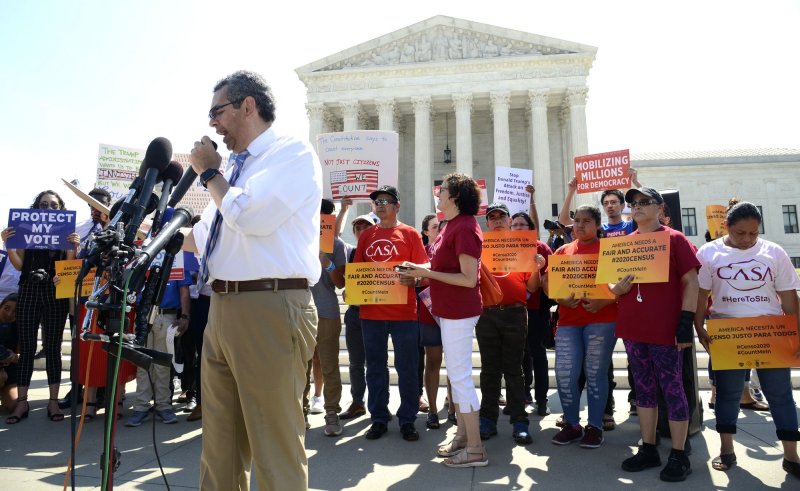Gustavo Torres of CASA, an organization to support immigrant rights, made remarks at the Supreme Court last month as the court decided to block the citizenship question. Now, a federal judge has ordered court proceedings on whether the basis for the question was to discriminate against immigrant communities of color. File Photo by Mike Theiler/UPI |
License Photo
July 6 (UPI) -- A federal judge will rule on a case questioning if the basis of the Trump administration wanting to add a 2020 census citizenship question is discriminatory.
U.S. District Judge George Hazel for the District of Maryland ordered proceedings to move forward after a court filing Friday to determine whether the Trump administration's intention behind adding the citizenship question was to discriminate against people of color who have immigrated to the country.
In the court filing that the judge required by Friday, Justice Department attorneys said that they are looking at other ways to add the citizenship question - "Is this person a citizen of the United States?" after the Supreme Court's rejection of their stated reason for the citizenship question last month.
Specifically, Chief Justice John Roberts said in the majority opinion that the Trump administration's use of the Voting Rights Act to justify the citizenship question "seems to have been contrived."
President Donald Trump has refused to give up on the citizenship question despite the Supreme Court's ruling against it and printing of the 2020 census already started. On Wednesday, Trump said he wanted to find a reason to add it that the Supreme Court would accept. The next day he tweeted that officials would work through the holiday on the question and on Friday, he said he is "very seriously," considering an executive order to put the citizenship question on the census. He has suggested that officials could still print the question as "an addendum," to the census.
Amid Trump's fight to save the citizenship question, more evidence about why his administration wanted to include it and if the reason was to discriminate could be unveiled in proceedings Hazel has ordered. Court documents show that officials in the Justice and Commerce departments would be subject to questioning under oath if the discovery process moves forward as planned.
"Plaintiffs' remaining claims are based on the premise that the genesis of the citizenship question was steeped in discriminatory motive," Hazel wrote in a letter explaining the order. "Regardless of the justification Defendants may now find for a 'new' decision, discovery related to the origins of the question will remain relevant."
Opponents said that an executive order could not replace the court's ruling.
"Such an order does not override a Supreme Court or other judicial decision; nor does it overturn or circumvent the congressionally established process for determining the content of the census," said Thomas Saenz, president and general counsel of the Mexican American Legal Defense and Educational Fund, which represents some of the groups that sued Trump over the question.
Commerce Secretary Wilbur Ross, who oversees the once-in-the-decade questionnaire, said Tuesday that the administration had abandoned its effort and begun printing census forms, but Trump rejected reports that his own administration has given up on the census question.
"The News Reports about the Department of Commerce dropping its quest to put the Citizenship Question on the Census is incorrect or, to state it differently, FAKE!" Trump tweeted Wednesday. "We are absolutely moving forwards, as we must, because of the importance of the answer to this question."















